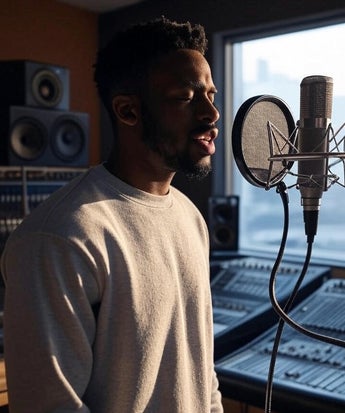Tips for Finding a Top Recording Studio for Recording, Mixing & Mastering
Unlock Your Sound: The Ultimate Guide to Finding the Best Recording Studios Near You
In the world of music, finding the right sound is everything, and it all starts with the perfect recording studio. Whether you're an aspiring artist, a seasoned producer, or a band ready to lay down your tracks, the environment you choose can make a dramatic difference in the quality of your recordings. But how do you sift through the myriad of options to find a studio that truly resonates with your artistic vision? This ultimate guide will walk you through the essential steps to unlock your sound, showcasing the best recording studios near you. From evaluating the equipment and acoustics to understanding the vibe and expertise of the engineers, we’ll empower you to make informed decisions. Let’s dive in and discover how to transform your music dreams into sonic reality—one studio at a time!



Understanding the Importance of a Quality Recording Studio
In the intricate tapestry of music production, the recording studio serves as the loom on which sonic dreams are woven into reality. The environment in which you record can dramatically influence the outcome of your music. A high-quality studio offers not only the best equipment but also an atmosphere conducive to creativity and precision. The acoustics, the ambience, and even the location can have a significant impact on the comfort and performance of the artist. For many musicians, the studio is a sacred space where magic happens, making it critical to choose one that aligns with your artistic vision.
The importance of a quality recording studio extends to the post-production process as well. A studio equipped with state-of-the-art mixing and mastering tools ensures that the final product is polished and ready for distribution. The clarity, depth, and texture of your recordings rely heavily on the technology and expertise available in the studio. This is especially true in an era where digital music is consumed globally, and the competition for listeners' attention is fierce. A professional studio can provide the edge needed to make your music stand out.
Moreover, a quality recording studio often comes with an experienced engineer and producer who can offer invaluable feedback and guidance. Their expertise can help refine your sound, fix technical issues, and elevate your music to the next level. Collaborating with seasoned professionals can also lead to networking opportunities within the industry, opening doors for future projects and collaborations. Therefore, investing time and resources into finding the right recording studio is a crucial step in your musical journey.
Key Factors to Consider When Choosing a Recording Studio
When embarking on the quest to find the perfect recording studio, several key factors need to be carefully evaluated. First and foremost, Quality of Past Recordings Listening to a studio’s previous work is one of the best ways to gauge its capabilities. Look for clarity, balance, and genre versatility in their recordings. A studio’s past work should align with your musical style—whether it’s indie, rock, pop or country.
Acoustics are another critical consideration. The design of the recording space should minimize unwanted reflections and resonances while providing a balanced sound environment. Look for studios that have invested in acoustic treatment, with properly placed diffusers, absorbers, and bass traps. A well-treated room can enhance the clarity and definition of your recordings, making it easier to achieve a professional sound. Additionally, the studio should offer a variety of spaces, such as isolation booths and live rooms, to accommodate different recording scenarios.
The vibe and atmosphere of the studio cannot be overlooked. The creative process thrives in an environment that feels inspiring and comfortable. Visit potential studios to get a feel for the space. Pay attention to the layout, lighting, and overall aesthetic. Does it spark creativity? Does it feel inviting? The right studio should be a place where you can relax and focus on making music without distractions. The staff's attitude and professionalism also play a role in creating a positive atmosphere, so choose a studio where you feel supported and respected.
Types of Recording Studios: Which One is Right for You?
Recording studios come in various shapes and sizes, each catering to different needs and budgets. The first type is the project studio, which is typically smaller and more affordable. These studios are often run by individual producers or engineers and are ideal for solo artists, small bands, and independent musicians. While they may not have the extensive gear and space of larger studios, project studios can still deliver high-quality recordings, with limited productions. They offer a more intimate setting and personalized attention, making them a great choice for emerging artists.
Mid-level studios offer a step up in terms of equipment, space, and services. These studios usually feature multiple recording rooms, a broader range of gear, and more experienced staff. They are suitable for bands, ensembles, and artists who need higher production values and more sophisticated recording capabilities. Mid-level studios often strike a balance between cost and quality, providing professional results without the hefty price tag of top-tier facilities. They are versatile spaces that can handle a wide range of genres and production needs.
At the top end of the spectrum are the high-end professional studios. These studios are equipped with the latest technology, vintage gear, and meticulously designed acoustic environments. They are staffed by top-tier engineers and producers who have worked with well-known artists and labels. High-end studios are ideal for major label projects, film scores, and other high-stakes recordings that demand the absolute best in sound quality. While they come with a premium price, the investment can be worth it for projects that require the highest level of production. Choosing the right type of studio depends on your specific needs, budget, and the level of production required for your music.
How to Research Recording Studios in Your Area
Finding the right recording studio begins with thorough research. Start by leveraging online resources such as studio directories, social media, and review sites. Websites like Sound Better, Yelp, and Google Reviews can provide valuable insights into the reputation and quality of studios in your area. Pay attention to ratings, client testimonials, and any recurring themes in the feedback. Look for studios that have consistently positive reviews and a track record of successful projects.
Networking within the music community can also be a powerful tool. Reach out to fellow musicians, producers, and industry professionals for recommendations. Attend local music events, open mics, and industry meetups to connect with people who have firsthand experience with nearby studios. Personal referrals can often lead to hidden gems that may not have a significant online presence. Don't hesitate to ask detailed questions about their experiences to get a comprehensive understanding of what to expect.
Once you have a shortlist of potential studios, visit their websites to gather more information. Look for detailed descriptions of their equipment, facilities, and services. Many studios offer virtual tours or photo galleries that can give you a sense of the space. Check their portfolio or client list to see if they have worked on projects similar to yours. This can be an indicator of their expertise in your genre or style. Finally, contact the studios directly to schedule a tour or consultation. This will give you the opportunity to see the facilities in person, meet the staff, and ask any questions you may have.
Questions to Ask Before Booking a Studio
Before committing to a recording studio, it's essential to ask the right questions to ensure it meets your needs. Start by inquiring about the studio's availability and scheduling policies. How far in advance do you need to book? Are there any peak times or off-peak discounts? Understanding the studio's booking process can help you plan your recording sessions more effectively and avoid any last-minute surprises.
Don't forget to discuss the staff and their roles. Who will be the primary engineer on your project? What is their experience and background? It's crucial to know who you'll be working with and their level of expertise. Ask about the studio's policies on collaboration and feedback. Will they provide creative input, or do they prefer a more hands-off approach? Understanding the dynamics of the studio team can help you gauge if it's the right fit for your working style.
The Role of Studio Engineers and Producers
Studio engineers and producers play pivotal roles in the recording process, each bringing their unique skills and expertise to the table. Engineers are responsible for the technical aspects of recording, such as setting up microphones, managing the soundboard, and ensuring optimal sound quality. They have a deep understanding of acoustics, signal flow, and audio processing. A skilled engineer can troubleshoot issues on the fly, capture the best takes, and create a clean, balanced recording that serves as the foundation for the final mix.
Producers, on the other hand, take on a more creative and managerial role. They work closely with the artist to shape the overall sound and vision of the project. Producers offer guidance on arrangements, performances, and musical direction. They often have a broad knowledge of different genres and production techniques, allowing them to bring fresh ideas and perspectives to the recording process. A good producer can elevate a project by identifying its strengths and weaknesses and making strategic decisions to enhance the final product.
The collaboration between engineers and producers is essential for achieving a cohesive and professional recording. While the engineer focuses on the technical execution, the producer ensures that the artistic vision is realized. This synergy can lead to innovative solutions and a higher level of creativity. When choosing a studio, consider the experience and chemistry of the engineering and production team. Their combined expertise can make a significant difference in the quality and success of your recording project.
Budgeting for Your Recording Session: What to Expect
Budgeting for a recording session requires careful planning and consideration of various factors. The cost of studio time is typically the most significant expense, and rates can vary widely based on the studio's facilities, equipment, and reputation. High-end studios with top-tier gear and experienced staff will command higher rates, while project studios may offer more affordable options. It's essential to get a clear understanding of the studio's pricing structure, including any additional fees for services such as mixing, mastering, or session musicians.
When budgeting, also consider the duration of your recording project. The time required to complete a session can depend on the complexity of the music, the number of tracks, and the level of preparation. Discuss your project timeline with the studio to get an accurate estimate of the hours needed. It's often wise to allocate extra time for unexpected delays or revisions. Some studios offer package deals or block rates that can provide cost savings for longer sessions. Be sure to inquire about any available discounts or promotions.
In addition to studio time, factor in the costs of pre-production and post-production. Pre-production expenses may include rehearsal space, demo recordings, and arrangements. Post-production costs encompass mixing, mastering, and distribution. These stages are crucial for achieving a polished final product, so don't skimp on quality. It's also important to budget for any additional personnel, such as producers, engineers, or session musicians. Understanding the full scope of your project and its associated costs will help you create a realistic budget and avoid financial surprises.
Tips for Preparing for Your Recording Session
Effective preparation is key to a successful recording session. Start by thoroughly rehearsing your material. The better you know your songs, the smoother the recording process will be. Focus on tightness, timing, and dynamics. Practice with a metronome to ensure consistent tempo, and record yourself during rehearsals to identify areas that need improvement. Being well-prepared will save time in the studio and allow you to focus on capturing the best performances.
Create a detailed plan for your session, including a schedule and a list of priorities. Break down your project into manageable tasks, such as tracking drums, recording vocals, and overdubbing instruments. Having a clear plan will help you stay organized and make the most of your studio time. Communicate your plan with the studio staff and any other collaborators to ensure everyone is on the same page. It's also helpful to prepare any necessary materials, such as lyric sheets, chord charts, and reference tracks.
Pack all the equipment and essentials you'll need for the session. This includes instruments, cables, tuners, and any personal gear. Make sure your instruments are in good condition, with fresh strings and proper tuning. Bring snacks, water, and anything else that will keep you comfortable and focused. Arrive at the studio early to set up and acclimate to the environment. Taking care of these details in advance will reduce stress and allow you to concentrate on delivering your best performance.
How to Maximize Your Time in the Studio
Maximizing your time in the studio requires efficient workflow and clear communication. Start by setting realistic goals for each session. Break down your recording project into smaller, achievable tasks and prioritize them. Stay focused on the task at hand and avoid getting bogged down by minor details. If you encounter a challenging section, consider moving on and revisiting it later. This approach will keep the momentum going and ensure steady progress.
Effective communication with the studio staff is crucial. Clearly articulate your vision and expectations to the engineer and producer. Provide them with reference tracks or examples that capture the sound you're aiming for. Be open to their feedback and suggestions, as their expertise can offer valuable insights. Establishing a collaborative and respectful working relationship will create a positive and productive atmosphere in the studio.
Take regular breaks to avoid fatigue and maintain creativity. Long recording sessions can be physically and mentally draining, so it's important to pace yourself. Use breaks to review your progress, listen to playback, and make any necessary adjustments. Stay hydrated and nourished to keep your energy levels up. Balancing work and rest will help you stay focused and deliver your best performance throughout the session.
Conclusion: Making the Most of Your Recording Experience
Choosing the right recording studio is a critical step in realizing your musical vision. By understanding the importance of a quality studio, evaluating key factors, and researching your options, you can find a studio that aligns with your needs and budget. Asking the right questions and understanding the roles of engineers and producers will help you make informed decisions. Proper preparation and efficient use of studio time will ensure a smooth and productive recording session.
Ultimately, the goal is to create a recording that truly represents your artistry and resonates with your audience. Invest the time and effort to find the perfect studio, and you'll be well on your way to unlocking your sound and achieving your musical dreams. Whether you're an aspiring artist or a seasoned professional, the right recording studio can make all the difference in the quality and success of your music. Embrace the journey, collaborate with talented professionals, and let your creativity shine. The studio is your canvas—it's time to paint your masterpiece.


Create Your Own Website With Webador